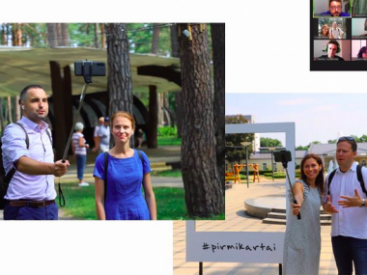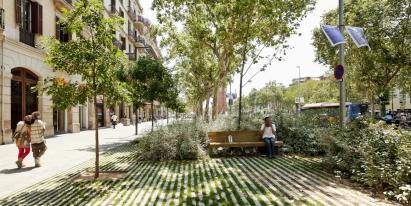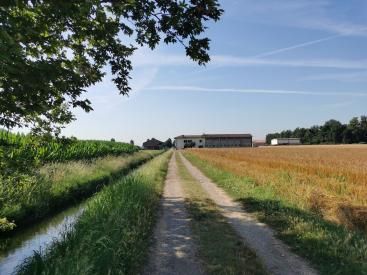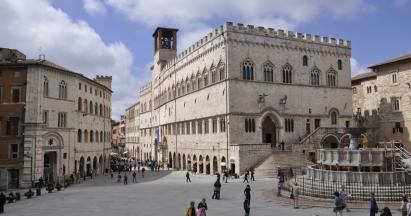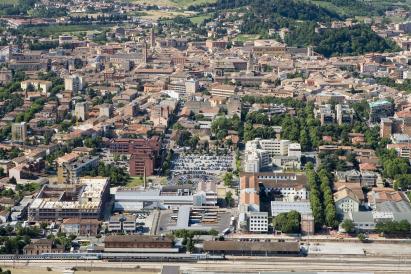-
-
Rewarding re-use and recycling
HungaryZuglóBringing together citizens and businesses for a more environmentally friendly society
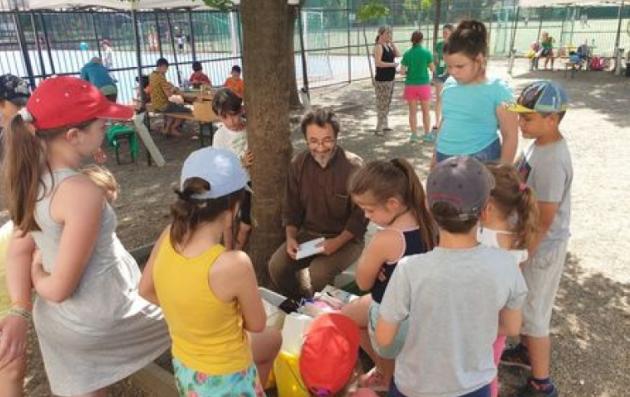 Project CoordinatorCopy linkFacebookXLinkedInEmail125 000
Project CoordinatorCopy linkFacebookXLinkedInEmail125 000Solutions offered by the good practice
Zugló, one of Budapest’s 23 districts, has a reputation for clean, safe streets and good transportation. Attracting a diverse mix of residents, the area is seeing considerable development, including new housing for young families. But this increasing population density means growing levels of waste to deal with.
The district’s waste is managed by a company (FKF) publicly owned by the City of Budapest. Before Tropa Verde, FKF already ran two modern Re-use and Educational Centres, where people could drop off useful old objects and which were frequently visited by school groups.
However, still about half of all collected waste went to a huge landfill site, and another sizeable proportion was incinerated. Only about 10 percent of municipal waste was collected separately by households and recycled by various companies. Tropa Verde was a chance for Zugló to take a fresh approach to encouraging citizens to recycle more.
First, a survey of citizens’ attitudes, habits, motivations and needs gave Zugló a basis to plan their new recycling reward scheme, adapting Santiago De Compostela’s platform to their own context. Next, they developed a clear online map enabling residents to find the right recycling facility for a range of waste items.
With support from the web company who developed Santiago De Compostela’s original ‘Tropaverde’ platform, Zugló launched its own local platform, accessible via the now international tropaverde.org. Just like Santiago De Compostela’s, this links in to an awards, or hulladék.pont, system, involving a whole network of local partners.
At designated ‘green points’, citizens can get a coupon with a code in exchange for the recyclable or reusable items they drop off. There are also rewards for composting. Points can then be redeemed on Zugló’s Tropa Verde platform – and spent in shops and organisations who have agreed to sponsor the programme.
Sustainable and integrated urban approach
The rewards system is an important way of engaging with both businesses and citizens about the environment. To further promote the initiative, the Municipality of Zugló launched a campaign to promote recycling jointly with FKF. And there have been environmental education events in festivals, children’s camps and schools. Other efforts have included a competition to collect batteries and used electronic devices, and a partnership with the Jane Goodall Foundation to collect used mobile phones.
As the project supports a much wider environmental management strategy, Zugló has benefited from strong political involvement, with the Deputy Mayor a key advocate for the activities throughout.
Participatory approach
The URBACT Local Group was particularly active in awareness-raising, thanks to their diverse members from cultural and sports institutions, the city’s philharmonic orchestra – and even Budapest’s Zoo, which is in Zugló. The Tropa Verde project was presented at the Budapest Gastro Festival, where the interested could not only get information about the project, but also get involved in the program by disposing glass waste. Prior to the Covid pandemic, in 2020, experts from the municipality and project partners visited the children's day camps in Zugló several times to raise awareness about conscious waste disposal, recycling and project goals as part of awareness-raising events. Following the pandemic period the municipality, together with a number of local NGOs, launched an online series of programs where participants could learn the tricks of composting in urban and apartment environment through entertaining, playful sessions, or even build an insect hotel. They got to know how to replace disposable packaging with durable solutions in the kitchen, bathroom, learned about clothing repair and recycling practices, and also about the impact of our meals and purchased foods on our environment.
It has to be underlined that Zugló’s implementation of the project, that started very successfully, has been strongly affected by the Covid-19 pandemic in 2020 and early 2021, as it interfered with all their plans, and forced to cancel promotional events and gather more sponsors.
Zugló planned to bring the program to local and residential events and festivals, while persuading companies of joining the project. They updated the flyers and created a banner to put on the entrance of joining companies to show that they are part of our program.
As part of long-term planning, Zugló created a communication plan, and launched the GP by using a mix of offline and online tools.
Towards the future, as a change, Zugló plans to most be present in more events and to include more companies, to guarantee the success and sustainability of the solution.
For such purpose, a database for those companies that could potentially be involved was created, and Zugló intended to contact them during the lockdown.
To summarize, Zugló has struggled to get sponsors to join the project and even those who joined had to close for business before even starting to accept coupons.
What difference has it made
At the start of the program, 6 waste disposal sites participated in the program, which we later wanted to supplement with a minimum of 10 pharmacies and 2 donation shops, but this plan unfortunately failed due to the pandemic situation.
In 2020, we reached about 200 elementary school students at our attitude-forming events. In the spring of 2021, we ran various awareness-raising campaigns and reached more than 6,000 people on the municipality's Internet channels.
Within the framework of the campaign, we promoted the 2 waste disposal sites included in the program for 2 weeks with the participation of FKF, where we drew 6 horticultural vouchers among the participants.
In an online lecture for local residents, a specialist from FKF gave a lecture on the ways of waste management in the capital with the participation of 30 interested people. In May, we held attitude-forming online programs with the participation of 5 civil organizations, 9 times, with the participation with a total of about 200 people. In cooperation with FKF, we held attitude-forming sessions in 9 kindergartens with the participation of about 1,000 children. The map containing the waste disposal sites created under the project has so far been used by almost 3,000 people.
Transferring the practice
Meetings with partner cities – including an event in Budapest in June 2018 – were great opportunities to exchange experiences and learn from each other, which enabled Zugló to identify similar problems in waste management and learn new skills to tackle them.
The aim is now to get more residents involved post-COVID and hopefully to roll out the programme across all districts of Budapest.
The hope is that each area of the city will set up its own URBACT-style local group, involving local sponsors across the city to promote the circular economy.
Main ThemeIs a transfer practice0Emailfejer.mate@zuglo.huRef nid16260 -
-
-
Bringing the commons to life
BelgiumGhentA new ecosystem of spaces for public-civic cooperation
Copy linkFacebookXLinkedInEmail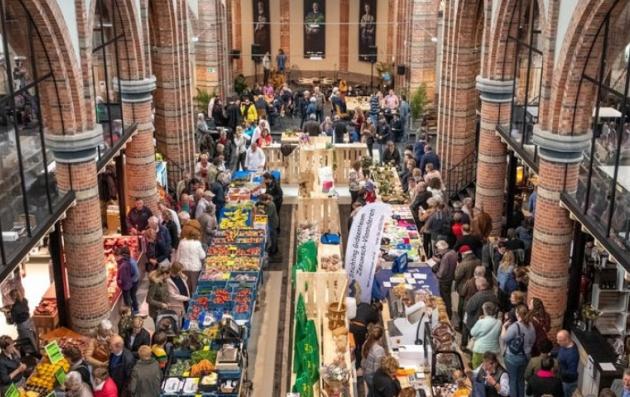 260 000
260 000Solutions offered by the good practice
Despite the strong tradition of civic engagement and participatory governance dating back to the nineties, the city of Ghent could not count on a regulatory framework supporting the wide range of civic initiatives from inhabitants. The occasion to experiment a new policy framework came with the example of “civic uses” in Naples about reuse of abandoned buildings as commons. In this frame the city of Ghent wanted to co-design a frame of co-management of public goods through a pilot project in the reuse of the 2018 desecrated Saint Josef Church located in the Rabot-Blaisantvest neighborhood. Rabot is one of the poorer ones in the city, known as an arrival district with 70,5 % of foreign descent residents (District Monitor Ghent, 2019) and with more than 90 nationalities. In 2019 the City of Ghent purchased the church to give it a new purpose in the form of public-civic management.
In the past, the city had been experimenting with civic-led temporary use of brownfield sites and empty buildings for over a decade (e.g. DE SITE in REFILL URBACT project) providing subsidies via the Temporary Use Fund with a budget of €300,000 available for citizens managed initiatives. Despite this, the public-civic management of the saint Josef Church presented a series of challenges new to the city, not least given the fact that the church was classified as historical heritage.
In order to realize the project, the City of Ghent has used several instruments. An open call to find a project coordinator was launched and a real estate agreement was closed between the manager and the City of Ghent. The project coordinator provided a threefold plan that encompasses the organisation of the use of the Church by citizens and organisations, the maintenance of the Church building and the creation of the democratic and economic management models for the Church. The coordinator must do so in respect of the guiding principles, e.g. all aspects of the plan must be community-oriented and take into account the specific needs of the diverse and colourful neighbourhood the Church is located in.
Throughout this procedure, the Policy Participation Service of the City of Ghent organised a Urbact Local Group (ULG), made up of members of different city administration offices, so that the citizens and organisations could be directly involved in the management plans of the building, given the opportunity to visit the site and express their wishes while giving their input on the uses. The scope is to strengthen collective responsibility, so that each member of the community contributes to the site’s management.
Following Covid-related delays, Ghent made the church building temporarily available in a city tool called ‘room finder’, giving citizens access to the building for their own projects up to 12 times a year.
Sustainable and integrated urban approach
The approach undertaken by the City of Ghent is fully aligned with the integrated approach of the Good Practice of Naples that it transferred. Ghent is a good example of combining vertical and horizontal integrated approach proposing a balanced coordination among soft and hard measures. In particular, the horizontal Integration was enhanced through the creation of a cross-departmental working team: the Local Administrative Working Group (LAWG), made up of members of the Policy Participation Service, the Real Estate Service, the Urban Development Service and the Legal Service. This has represented a key highlight and added value to the project. Some representatives of the city’s participation and legal departments met and started working together for the first time through this pilot.
The LAWG task force has worked so successfully that it will keep existing after the project and make a regular consultation between different services involved in making urban real estate accessible, for example encouraging the re-use of abandoned buildings and developing the necessary tools for this purpose.
In addition, a legal-administrative incubator will be established, which will offer support to starting-up residents' initiatives.
Participatory approach
The city of Ghent has a long tradition of participatory governance, boosted with the former Mayor Daniël Termont (2007-2018) as the strongest supporter of civic participation and co-creation. Before that, already in the 1990s, Ghent had created a Participation Unit to encourage a bottom-up approach to planning and decision-making. Civil servants of the Participation Unit function as Neighborhood managers in order to connect with citizens and with society in the 25 districts of the city. They deliver tailored work to create more livable, more social and more sustainable districts. They are the go-between between various stakeholders in order to find solutions to urban challenges existing in the neighborhood, linking the city council and the city’s residents.
Over the years, the unit has developed different instruments (Participation platform, Crowdfunding platform, Temporary Use of vacant buildings, Participatory budget, neighborhood management projects, including subsidy agreements, permits for using public space et al.) to enable and support citizens’ ideas and initiatives. More recently, citizen initiatives and civil servants co-wrote Ghent’s 2017 Commons Transition Plan for a sustainable and ethical economy. The political will and support in participation extends after the Termont mandate with the assignment of a Deputy Mayor of Participation.
As for the specific case of the Saint Josef pilot, the URBACT Local Group (ULG) methodology has been fundamental in enhancing citizens and organization participation and involvement, as it entailed various activities and tools not only to make citizens actively engaged in the process, but also to listen and debate about their views and concerns on the management of the building.
Differents identifications and monitoring tools are been used to listen to people to people's concerns, such as:
- Neighbourhood of the Month;
- sounding board groups & think tanks;
- a participation platform;
- think tanks with long-term participation projects (En Route, "Room for Ghent", citizens' cabinet);
- SWOT analysis and monitoring table for indications (neighbourhood analysis, recording and following up on indications);
- detection of indications by means of stories (testimonies).
What difference has it made
The positive influence of Civic eState network can be felt at many levels in Ghent. It has given a boost to the cooperation between city services and in the cooperation between residents' initiatives and the city administration; it helped in creating a stable task force in the municipality called the Local Administrative Working Group ( LAWG) to make a regular consultation between different services involved in making urban real estate accessible; and implemented a pilot project in the reuse of the Saint Joseph Church.
The tangible result is that Saint Joseph Church is now returned to the neighborhood as an open space that gives local residents the opportunity to develop activities and a social network based on their own needs and possibilities.
Ghent plans to bundle a lot of ideas and work towards a kind of step-by-step plan of how as a city they can improve their organization for the benefit of the commons. To help a long-term focus on citizens initiatives, a “catalogue” was elaborated by the Local Administrative Working Group to make a concrete step-by-step plan together with the two services: the Policy Participation Service & the Real Estate Service of the city.
This will help to sum up the work done and what forms of involvement the city organizes for and with the neighborhood, providing a basis for replicating the pilot approach in other areas.
Transferring the practice
Through Civic e-State the City of Ghent joined a community of European municipalities that experimented in their local contexts the creation of urban commons regulation in a transnational peer-learnig mode of cooperation. Ghent learned a lot from the legal documents (city regulations and agreements) received from Napels and Barcelona. These documents contained interesting definitions and principles, which have been adopted for the open call of Ghent's pilot project. At the same time, Barcelona and Amsterdam opened Ghent's eyes to the importance of measuring the social return of certain projects.
Then, after visiting similar initiatives in the other partner countries, the City of Ghent has succeeded in applying the practices and learnings in the Saint Joseph Church pilot project.
Main ThemeIs a transfer practice0Emailbeleidsparticipatie@stad.gentRef nid16249 -
-
-
-
-

